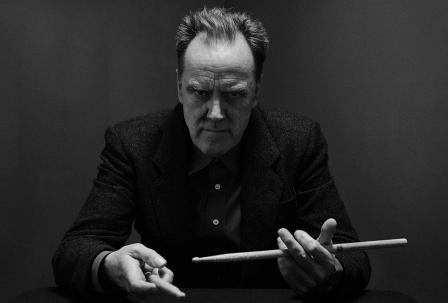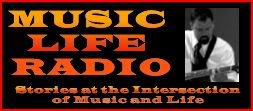Punk Globe got the chance to speak with co-founder and the drummer of This Heat - Charles Hayward. In the interview Charles speaks about postmodernism and instrumental music, about “Deceit” and “Health And Efficiency” and live-shows, about the upcoming solo-records and punk-rock.
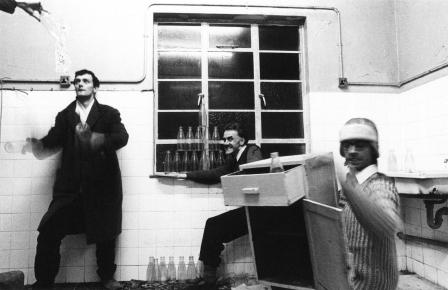
Punk Globe: It seems that This Heat united different prog-rock-ish tendencies. As well as certain provocative element. Tell us, what led to the appearance of This Heat, and what musical inspirations that you’ve been attracted by, at that point ?
Charles: There was a sort of concentration on developing our instruments. On out technique of playing that Charles [Bullen] and I had both fallout diligently for 14 of 15 years before we formed This Heat. When we formed This Heat with Gareth Williams who hadn’t played at all. It made us question this technique we had accumulated. And we had accumulated this technique during the period when the music around us was becoming more and more virtuosic. More-more skilled. Less and less related to live. And more and more related to other music. Charles and I had a few bands before forming This Heat. And the one that we most…I suppose the word is “owned” was a duo where two of us played. Dolphin Logic. And we played sort of completely improvised music. But we also, to a very-very-very small extent put out lives into that. I’m talking about things like using tape-recorder Which implies something happened before and you brough it to the moment. There were a little things like that made it different from a lot of improvised music was seemed to be about. It did have this sort of extreme-non-jazz attitude. But then, we met Gareth. And he could only play from a stomach…To the point where he’d play the instruments that weren’t touch sensitive. But he’d get blood – all over. Due to the emotionality. That blood did nothing other than being a part of him. It wasn’t a part of the sound. Because, the notes didn’t relate to how hard you in. He needed that! But we were feeding of that energy as well. So I suppose, there was a certain sort of…Because, we were doing this before Sex Pistols raised their heads above. Before The Clash. Only 6 months. But before. And they were obviously doing their thing. But we were doing our thing. Our thing did have this undertone. Of having been influenced by the whole other music from very-very far back. And also, from the recent past. Charles and I used to try and almost outdo each other with the records we could play to each other. I’d had this experience when I was young. First of all, my father was a music nuts. He introduced me to the emotional value of music. But then there was also a record-library very near me. And also – The Who and Pete Townshend…Pete Townshend would buy the tickets and go to the opera. What can you do when you have a top ten hit ? And you got a bit more money ? Oh… I can go to the opera. I’m going: “Wooow! This guy smashing his guitar is going to the opera!”-there was an amazing interview with him. When he in ONCE sentence mentions: Debussy, Ornette Coleman and The Beach Boys. In one sentence! 1964 or something like this. So I’ve already been completely turned on by the middle section of “Anyway, Anyhow, Anywhere” – their second single. This auto-destructive beat. And it just SO EXCITING. So it’s really changed my mind. Then I was listening to what he was saying. And there was a record-library down the road. In the record-library there must have been someone there who had a job that she or he loved. Because, they brought some sort of imagination beyond of a job. To their work. And the diversity of super-quality music. But not just classical. Jazz and real edge of jazz – things like, I heard: Ornette’s double quartet free-jazz album. I got all Ornette Coleman, all Miles [Davis], all the Coltrane. All that music I got from this library. But I got that first of all by Townshend, so I got turned on by him. I used to go to this library like crazy! So I was listening to Bartók, I was listening to Webern, I was listening to Schoenberg, I was listening to Monteverdi, I was listening to William Byrd. It was a wonderful thing! And Charles Bullen has been doing the similar thing. I don’t know the details of that. But we both were turned on CAN. All these different things. A lot of the music we were listening to was self-made. It didn’t asked the permission from a record-company. Sun Ra would make their own records, CAN would make their own records, Iggy Pop …Everyone was trying to bring it back, to make it real, make it raw. All the European imporov-people. Alan Parker, for example. All of them were using a couple of stereo mics and real-to-real in the corner. So there was this need to make something that wasn’t American. And basically, we were trying to find the way of doing that. And then, when we met Gareth, it was like: “Ok, now we’ve got something to offer to the world!” – somehow we said: now, we’ve got the voice. It was like growing up or something. It was like, in the old days when you were 21 you had a party. And after that you was a man. Before that – you wasn’t. I’m talking very old. But we sort of decided between us, that now we were making something heavy. And even before that, I’ve been researched towards that.
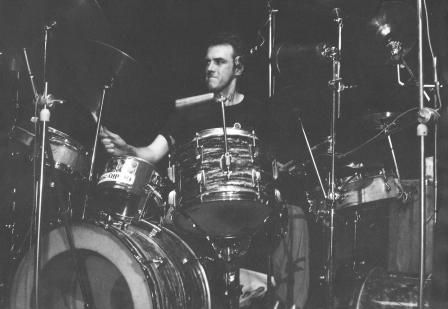
Punk Globe: Mid-late 70’s was a revolutionary era for the music. With becoming of punk-rock, lots of esthetics and musical changes happened. And, somehow, people always been associating your creativity with punk-rock. What did you take from punk ?
Charles: Well, there was “before” we heard the music and “after” we heard the music. When The Clash did that single “White Riot” and on the B-side was “1977” that got the chorus “No more Beatles or Rolling Stones!”. We hadn’t heard it. We were reading it in the music paper. We met this lyric and it was like: “YEEEEES!”. Then we heard it, and I have to say that it was like: “Ok, “No more Beatles or Rolling Stones” – so what it really means ?” Chuck Berry ?” – it didn’t feel forward. It felt like “back”. It wasn’t fundamental in any way for us in terms of sound. It was fundamental in a way that it was trying to make appoint. It wasn’t really respecting the sound. And for us, the primary thing was the sound. The sound it itself was a radical thing. Everything grew from the sound. The sound was the place where revolution happened. The sound wasn’t a tool for the revolution. The sound WAS the revolution. So that’s a different attitude, I think. Even though our lyrics became increasingly political, we always been very considered and we’ve never been sloppy. We only had validity in terms of being a world of sound. For me this is very-very-very fundamental politics. I think, all politics should be sound. I don’t think it should be spoken. I think, I can hear bullshit when it’s sound. Very-very clear. I think everyone can. I would like to have all that political discourse exchange in a song. This is my idea of an utopia.
Punk Globe: Your self-titled debut record is very different. Stylystically. The structure is interrupted by certain manipulations. What was your work like – did you have a certain rehearsing period, or you took the liberty of experimenting – as much as possible ?
Charles: Em…I suppose, if we’d get back to record-libraries experience we had this improvised thing, that was very physical. We had this other thing that was very written. And then we had the third thing I didn’t mention earlier. Which was the new music coming out of technologies. These were people like Stockhausen, Pierre Henry, this would overlap interesting places with people like John Cage. He wasn’t quite the same. But there was overlaps. That was a thing we were really interested in. And which improvises that we knew would sneer at. They’d lough at the fact that we were into editing. Or that we were into overdubs. Or any of that stuff. For us, it was like an emotional tool. Multiplicity of the organizational systems. The lack of one pure system is actually our description of “politics”. It’s not all improvisation or it’s not all hierarchical song. Or there’s only about what’s in front of you. Or it’s only about what we thought about. It’s ALL these things.
Punk Globe: Wasn’t it hard for you to re-create that atmosphere playing live ?
Charles: I think there’s a live in these records. In a way, these are two different avenues. But what you can do – learn from bringing one to another. We sort of learnt how to play edits live. Or to know that we’re gonna make an edit and do it in a structural way. Some beat would be recorded in a living room. And another beat would be recorded in 24-track studio. And we knew, while doing that we’re gonna put this beat into that beat. So, we were thinking in terms of that. A big influence to that were “Good Vibrations” by The Beach Boys. There are 6 different studios that I think were used on the one song. And some bits where I could never understand what was going on. But the air changed. Cause they were in the different studios. For just a couple of lines or something like this. That kind of usage of these technologies became very emotional. My wife, my partner who were with me back then…And I’m still with, she used to think that the records were pale-pale shadows of the gigs. The gigs were much-much better.
Punk Globe: It’s very much like Dadaists who tried and experimented with different syntactical and word-building structures creating their own language. Don’t you think that what you’ve been doing is quite similar to them ? When you started using all these techniques stepping outside of stereotypical way of recording.
Charles: Yeah! That’s what I mean saying suddenly we were 21 years old and now we were men. That’s the old idea. But this is exactly what I mean. We were ready to not be told what we could and couldn’t do in terms of even recording. We owned it all. We didn’t have to be in any way of any particular line. We wanted to make our own line. So yes, we story of gave ourselves permission. I mean, the only permission that’s relevant, I think, is the permission you give yourself. Everything else is basically following the instructions – in a certain way. You have to take your permission. Do you understand what I mean ?
Punk Globe: Yeah! For sure!
Charles: I’ve decided doing this because not anyone else telling me. I’m doing this because this is what needs to be made.
Punk Globe: As collective of musicians did you always had a clear understanding about what each other should do or there was a certain approach ?
Charles: This…Maybe is discrediting. I don’t know! Certainly, it’s disregarded old Marxist idea – the dialectics. That says all to me. We would work together. And we would criticize each other. We would try and change each-others playing. We would basically make it better by doing it to each other. Nothing was ever good enough. If we would work on something that wasn’t improvised then there was more and more an exact version of what we wanted to do. There was an esthetic about the rhythmic feel. And it wasn’t anyone left to anybody else to do their part. We were all on top of each-others’ case. There’s a John Cage music piece called “Music Circus”. And it’s basically a set of instructions united ideas and stuff. One of the ideas – in the future all music would be either solo or free-collective-improvisations. Because, in both these situations nobody tells anybody else what to do. So we had a third approach. Which was: everybody tells everybody what to do. It wasn’t one guy tells everybody what to do. Everybody tells everybody else what to do. This mean that the process could be EXTREMELY SLOW. At first you get this inspirational moment. And it would be “the moment” but if you wanted to develop it – it will take 6-7 months. Very-very. To the point when we didn’t make any music for three months. We just met everyday. And sort of argued, debated, agreed – for about five hours a day. And then again. We didn’t make any music.
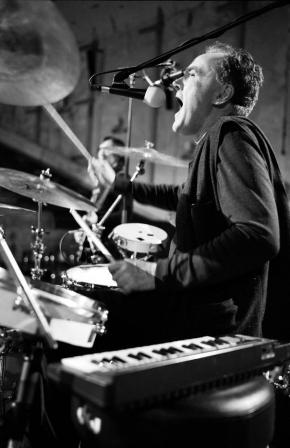
Punk Globe: “Deceit” became not so experimental of a record – in comparison with your debut and followed “Health And Efficiency”. More meditative. And containing turned back components of mainstream music. You once said that it represents a duality for you – but don’t you think it’s more of a conflict you put in the core of the record ?
Charles: We’re inside this process, inside this system. And we’re criticize this system. But we are inside it. We are communicating with our audience. By denying, refusing and “there’s something better” for us. And we can build this. But we’re using vinyl to make the message happen. We’re using an industrialized process to distribute that. And there’s a contradiction to that.
Punk Globe: We all know very good “history repeats itself” chorus. But generally, this record sounds like an expression of some of the ideas worrying you, at that point. Especially political. What affected you the most, at that point ?
Charles: Yes, I suppose. I can remember Margaret Thatcher has been voting in on the day I came back from the factory with test press of the cover of the blue and yellow [note – Charles refers to This Heat’s debut record] record. “Blue and Yellow” was made before Thatcher. But after that there was the whole wave of Thatcher….I can’t remember who should be yours… Brezhnev. There was this whole thing of a sort of clash that was quite scary. Even down to the poetry of it. “Mutually assured destruction” – the concept “MAD”. So, these political leaders talking about these things that became more and more a thing for all of us, really. “Health And Efficiency” was more like: “Let’s be healthy! Let’s not be negative!”. If we’re gonna critique the status quo across the globe then it doesn’t mean we have to be our parents’ nightmare. We don’t have to be drunk and speeding all the time. We can be strong. Being strong is a political act. It’s not a fascist political act. It’s socialists’ political act. Because, your strength means you can share the strength with other people. When somebody else needs your help – they too, tried to be in a strong position. And now they need your help. Later on, when you do the same – that’s cool! Because, you try to be healthy. It’s not trying to gone along being un-healthy. Especially as if it was a revolutionary act. I saw some things in Berlin – in the punk-gigs. “Why you being so willfully unhealthy ?!” – you’re just programmed as your mom and dad. But these are different programs. It’s just “backwards and forwards” thing. The next stop would be just “Ne-ne-ne-ne-ne-ne!” which is sort of what I feel about a lot of stuff now. Even though I agree with a lot of young people – where they want the world to go, they seem to going: “Yes! No! This way! That!” – it’s such an extent. If feels like going back time. For me.
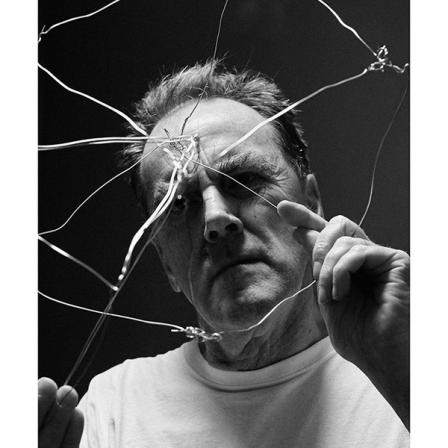
Punk Globe: After the breakup of This Heat you went on to work with numerous collaborators. And as session musician a lot. Your debut solo “Survive The Gesture” was released six years after “Deceit” – tell us, what drove you away from collaborative work to solo-creativity ?
Charles: Life, basically. In between This Heat and “Survive The Gesture” was a band called Camberwell Now. And we made three records. Two maxi-singles, two EP’s and one album. I did that. And that was a very collective experience as well. Down to the fact that with each instrument we made our own sounds and thing on the sounds weren’t necessarily made by the guy build the instruments. Everything was mashed up. We carried working like that. That band came to a very natural conclusion. It was beautiful in it’s ending. It was a very natural thing. People all moved on. One way or another. And it was a great group. I listen to some of the live-stuff from some of the years and I couldn’t believe that it was live! It felt to me as the strangest music I’ve ever heard. I couldn’t work out at all! And I slowly realized what I was listening to. It just blew my mind. Anyway, it was a wonderful group! Inside this group – we were on tour one year. And we had three days without any gigs. That was a disaster, if you were on tour. The guy who made the tour together came across this festival – the festival of solo-performance. He was our guy, playing tape-machines. He was a member of a group. And he said to me: “Look, if you’ll do this gig solo – we all will have somewhere to sleep!”. So that it how I did my first solo-gig. It was basically me, doing something needed to be done. To get the group from gig here to gig here. That’s what I did. I knew it about six weeks before the tour. So I sort of worked on a couple of things. But it went very-very well. And musician whom I very much admire was playing in the afternoon and saw my gig. And then, he had to drive 150-160 miles to do the sound for another band he was working with. And [he] found out that the gig was so good in the afternoon that the organizers of the gig said: “Will you do it again this evening ?” – so this musician whom I very much admire drove 150 miles did the job and then DROVE BACK to see me playing. And drove back to the band he supposed to be with. So he drove 450 miles to see the second version of my gig. And I was sort of: “WOOOW! I think this guy is a great musician. It’s just a huge complement!” so I just took is quite seriously. And at the same time, I got offer for a record-deal. Just for one album. The whole thing just…happened. By then, I been talking to Charles and Gareth about the experience of being in a band. It made me feel that if I wanted to write lyrics, I should very much take responsibility from the start…Because, in different cases it felt like it wasn’t what happened. That felt very hurtful to me in so far as I didn’t take the credit for the lyrics on the albums. Gareth wrote 2\3 of “Paper Hats”. Charles wrote 2\3 of “A New Kind of Water” – everything else, lyrically, it was me. But I never took a credit for that. As it was group experience. Collective. That started falling apart sometime later. And that John Cage – in future there would be no solo or collective…That sort of hit me! If I wanted do structure stuff – I’m going to take a responsibility. The only way I can be open is maybe the improvisation. That’s what I did. Or I may be in somebody else’s projects. And they would sort of tell me what to do - that would be cool to. It’s not like interaction. But in a weird way, my confidence got undermined. So I just sort of said ok: “Ok! From now on the songs are gonna be solo!” but at the same time as “Survive The Gesture” happened, we were about to have our first child. Having children for us was a big thing for me. It had been something that almost brough us together. We both sort of admired childhood. So the lyrics did become more-more personal. And the lyrics did become more about a life. Almost a move from “we” to “I”. I don’t really see the world in terms of “Us and Then” – I see the world in terms of “Us”. Even people I disagree with. That’s what I mean! As a part of this idea of dialectics as far as I can see.
Punk Globe: As a musician you never tend to follow one melody-line combining bits and pieces of different things andthen adding them to the compositional structure. How can you characterize your approach to writing music ?
Charles: I think all of it, in one way of another is sort of construct. I sort of started at one place. And I move forward – maybe an idea accumulate. This Antonin Artaud idea of no text is complete. That’s why recording is a difficult thing to me. ‘Cause, it’s actually fixes things down. At a certain point of way, you’re getting a definitive version of what your song is. Whereas for me, each time playing a song is just another version. It’s never-ever complete. You walk away from albums. And then you carry on playing material. But you change it! So that’s an attitude a bit like someone walks through the city feeling different things and collages them. But I have down are things I do in other project suddenly don’t belong there. They belong somewhere else. So it’s about keeping my ears and my anathemas open. But the big thing to me is just where the creative information comes from. For me it has been a problem. When This Heat had “Cold storage”, the guy above us – Rorry Ray Chamberlain. And he was friends with Daggy Fields and Andrew Logan…We were talking about postmodernism. I didn’t quite understand it back then. Someone like Tarantino is postmodern artist. And it seems what it really means is a series of vailed quotes. Contractual homages of pastige. And information is used to feed that way of making creativity: other music, other things. It almost a form of consumerism. A form of late capitalism. Like capitalism eating itself. Right now, I think there are SO MANY versions of capitalism eating itself. One of them would be maybe DJ-culture. Or sampling culture. This is the model of eating itself, referencing that to something made earlier. Putting in that in that way. All the stuff if basically by-stuff put together. For me the really important thing – I would rather see something made by little old lady doing some knitting. Then something like Tarantino-type-of-postmodernism. That postmodernism-stuff is only informed by itself. By other thing that’s the part of this market. Whereas the thing interests me is life. So I don’t need to hear any new stuff really. Because, to the point is the new stuff telling me what other musicians’ life is. I need to find what my life is and share it. If some of this already has been done – that’s where the world is at the moment. Something to do with technologies, something to do with politics. Just the way the world is! That’s why people come to their conclusions. I wanna to come to my conclusions now. Without thinking who the other musicians are. I’m not talking to other musicians. I’m talking to people who aren’t musicians. So I need to draw from that. And I find shopping very influential.
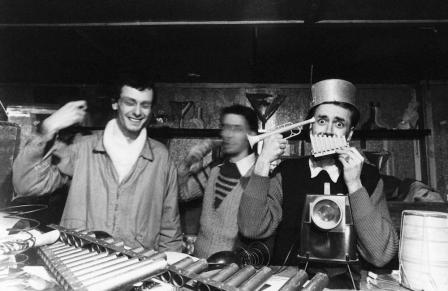
Punk Globe: Just like some artists – like Damo Suzuki found his inspirations in physical exercises , walking outside etc.
Charles: Absolutely! Absolutely! I mean, movement is inspirational. The lockdown…I think lots of people been switched on by creativity-things. Whether it’s hobby or something they always wanted to do. And started doing. I think that’s fantastic. There are some professional musicians like me, who have found our the way to carry on. But for me, it has been the least creative time for YEARS. For absolute years. Almost like I stuff I need to feed the system with. And basically, I need to rehearse with other people, play with other people, work with other people – all that stuff. And I haven’t had enough stuff for the last mouths.
Punk Globe: Your recent solo-album “Crossfade Estate” came out in June 2020. You started recording it around 2005. When the basic recording was made in 10 hours or. What do you think about this record when it’s already came out ?
Charles: I made the record in 2005 and then Ashleigh Marsh and I took 18 mouths mixing and collaging it. Then…my life-stuff, stuff with my parents got me in the way. And also it took a long time for me to decide whether it’s good. So I have to listen to it for a long time. By then, my life has changed again to the point if I wanted to really have a creative flow happening for maybe few years, I need to get into some recordings more than concentratedly working on gigs – I needed not travel so much. So for about three years I’ve made another album which was “One Big Atom” – I made that on 4-track machine and mini-discs. It took me a long time and concentration. But made me carrying forward my creative thing. Doing that, I forgot about “Crossfade Estate” – it just went on the backburn. And so…You got to realize there’s a lot of confidence about this. “Being confident” and “Not being confident” – which is maybe different from other people do. Making someone going apparently backwards. Almost like with jazz-rock on this record. Almost like backwards. But then, going forwards. Just letting yourself be. And then – starting warrying about that. So the lockdown happened and I was able to let the record out, basically. I’ve been listening to it over the years it wasn’t released. And I much work on getting the sound. But it’s always about timetable, changes. There’s no future plan. I got maybe…one record finished and ready to go. I got another one that’s near to completion. And I’ve got two down in my head.
Punk Globe: Tell me a little bit about the records you’re working on now ?
There’s collaborative thing called “V 4 V” – thar’s a quartet. Where’s Nick Doyne-Ditmas on the bass and fluent vocals. I’ve worked with Nick during 30 years or something. There’s a guy called Vern Edwards who’s a local figure, he plays guitar. And there’s a local woman called DJ BPM. She’s got a show on Resonance FM. A straight-ahead DJ. But with us, she’s such a “madam psychedelia”. She plays basically samples from the culture from about 1940 up to present day. She completely melts them and make them come back in different shapes. We do this like a ritual. We have a certain sort of shape. But it’s different each time. We recorded on rehearse. We concentratedly did 8-9 versions of ritual. And we choose the one we like the best. That’s “V 4 V”. That’s a collective group piece. There’s another album called “SE8”. It’s a post-code for the neighborhood I live in. And the music is built from either samples or from the area. Buildings being built. Like this. There were two days I recorded. Both of them were very-very different. I set up for different moods. But they were moth centered around one particular note, chord. Helicopters going over, airplanes going over and stuff. Also, a field recording of a cow-station. I think it’s very beautiful. There’s a very little drum on it.
Punk Globe: But the production techniques that you’re using are quite different. What helps you to find the way of getting sounds out of your head ?
Charles: I think a lot of my mind is actually in my hands. So I can be hugely print-screen Hollywood in my imagination. But there’s also a practicality of actually making this happen. And then the practicality is often re-chose everything to the essence. And then the essence isn’t actually a “big Hollywood thing”. In fact, the real thing is much more manageable. Much more human. It’s not Vagner – it’s Morton Feldman. Much more possible. But full of imagination. That’s the first thing. Second thing is work with what’s in front of you. If you need to make something. Then the making of the thing is also the thing. The thing with your making isn’t outside of the making. It isn’t God in 7 days. That’s bullshit. It’s not even the idea of what you’ve been trying to make happened 10 minutes ago but then you find something else. I had situations where I wanted the sound to go very like this. And then move working, I hear it and it’s like “Oh, my God! That works like this!”. And actually, change what I want. I don’t really want anything. What I want to do is to obey. I sort of obeying the sound. The sound tells me what to do.
This Heat on Bandcamp: https://thisheat.bandcamp.com/


